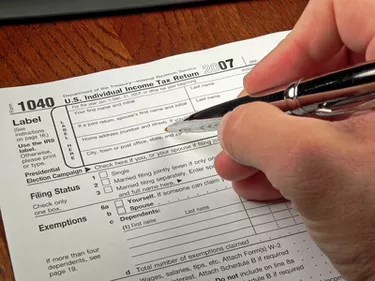
Your taxable income is determined based on your overall income for the prior year and reduced by various deductions and exemptions. The process of determining your taxable income can be difficult if you qualify for various situational reductions. Consider your situation carefully and include all possible reductions to your adjusted gross income.
Step 1
Determine your earned income total. This includes any pay you earned during the prior year. Tips, bonuses and unemployment benefits are all included in this total. Some corporate benefits must also be included in this section, such as sick pay, company car and event tickets. If you have any questions about whether specific benefits quality as earned income, speak to a tax agent familiar with your local laws.
Video of the Day
Step 2
Calculate your unearned income. This includes interest and dividend payments on any investments, profit from sold assets and business income if you own your own company. Rent paid to you, royalties and gambling gains are included in this figure.
Step 3
Add your earned and unearned income to determine your adjusted gross income.
Step 4
Decrease your adjusted gross income through deductions. A standard deduction amount is available for all filling their income taxes; however, if your situation fits into one of a few specific categories, you may be allowed to take a higher deduction. These categories include having paid large medical expenses, charitable deductions, mortgage interest and other similar categories. Determine your category and make the appropriate reduction in your adjusted gross income.
Step 5
Subtract your exemptions from your new adjusted gross income. Exemptions are preset values based on your particular situation, such as children, spouse and possibly your parents. These exemptions constitute a significant decrease in your tax responsibilities, so be sure to include all exemptions to which you qualify.
Step 6
Be aware of other specific tax adjustments. These are often very situational and change from year to year. Consult your tax agent for significant tax adjustments. Keep accurate records of significant purchases during the prior year and present these to your tax agent. Include school fees, new cars purchased or new home expenses. If you have questions about a particular purchase, ask your tax agent to review your situation carefully to ensure that you receive all possible benefits.
Step 7
Locate your complete adjusted gross income on your tax papers to determine your current tax responsibilities. Your tax chart will break down your tax responsibility from which you can compare the taxes you paid throughout the year with your overall responsibility.
Things You'll Need
Calculator
Income statements
Expense records
Video of the Day